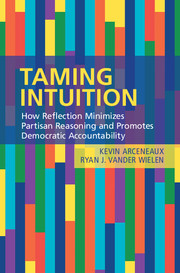Book contents
- Frontmatter
- Contents
- List of Figures
- List of Tables
- Preface and Acknowledgments
- 1 Democratic Accountability and the “Rational” Citizen
- 2 A Theory of Individual Differences in Reflection and the Intuitionist Model of Political Reasoning
- 3 Measuring Individual Differences in Reflection
- 4 Toeing the Line: Partisan Identities and Policy Attitudes
- 5 Throwing the Rascals Out: Partisan Identities and Political Evaluations
- 6 Can't We Disagree without Being Disagreeable? The Role of Reflection in a Polarized Polity
- 7 Reflections on the Role of Reflection in Democracies
- Appendix Details of Empirical Studies and Statistical Analyses\
- Notes
- References
- Index
7 - Reflections on the Role of Reflection in Democracies
Published online by Cambridge University Press: 30 August 2017
- Frontmatter
- Contents
- List of Figures
- List of Tables
- Preface and Acknowledgments
- 1 Democratic Accountability and the “Rational” Citizen
- 2 A Theory of Individual Differences in Reflection and the Intuitionist Model of Political Reasoning
- 3 Measuring Individual Differences in Reflection
- 4 Toeing the Line: Partisan Identities and Policy Attitudes
- 5 Throwing the Rascals Out: Partisan Identities and Political Evaluations
- 6 Can't We Disagree without Being Disagreeable? The Role of Reflection in a Polarized Polity
- 7 Reflections on the Role of Reflection in Democracies
- Appendix Details of Empirical Studies and Statistical Analyses\
- Notes
- References
- Index
Summary
We end where we started by considering the most fundamental question in democratic theory: Are the people capable of self-governance? Rule by the people is a core tenant of democracy in all of its ideal forms (Dahl, 1989). If “the people” are not up to the task, then democracy is inherently impossible in practice. In electoral democracies, self-governance requires that voters are willing and able to hold elected officials accountable for their actions. The empirical study of democratic accountability is rich and replete with reasons for optimism and pessimism. In this book, we tackled what many scholars and observers see as a formidable threat to democratic accountability: partisan-motivated reasoning. If people are more interested in cheerleading their political party than they are in holding elected officials accountable, then it frees elected officials to pursue their own goals even at the expense of their constituents.
To get a handle on this question, we began by articulating a model of political reasoning that builds on recent advances in cognitive psychology and neuroscience and, we believe, extends and updates preexisting models of political attitude formation. Our Intuitionist Model of Political Reasoning starts with the same foundation that contemporary models of motivated reasoning do. People initially process information (political or otherwise) outside of conscious awareness in a way that is heavily guided by emotions (i.e., System I processing). The intuitions that result from these System I processes nudge people in the direction of a particular decision. In the domain of politics, people's partisan identities shape their intuitions, leading them to root for their team even when they should not. The Intuitionist Model of Political Reasoning departs from the standard partisan-motivated reasoning framework in how it treats cognition. In the standard framework, thinking is for rationalizing. To the extent that partisans bother to think about their political decisions, they take a biased approach that discounts evidence that calls their intuitive response into question while latching onto evidence, no matter how weak, that lends support. In contrast, the Intuitionist Model allows people to be reflective – to use cognition (i.e., System 2 processing) as a way to critically evaluate their intuitive responses.
Whether people choose to use System 2 processes to engage in reflection depends on psychological motivations that vary across individuals, space, and time.
- Type
- Chapter
- Information
- Taming IntuitionHow Reflection Minimizes Partisan Reasoning and Promotes Democratic Accountability, pp. 152 - 176Publisher: Cambridge University PressPrint publication year: 2017



